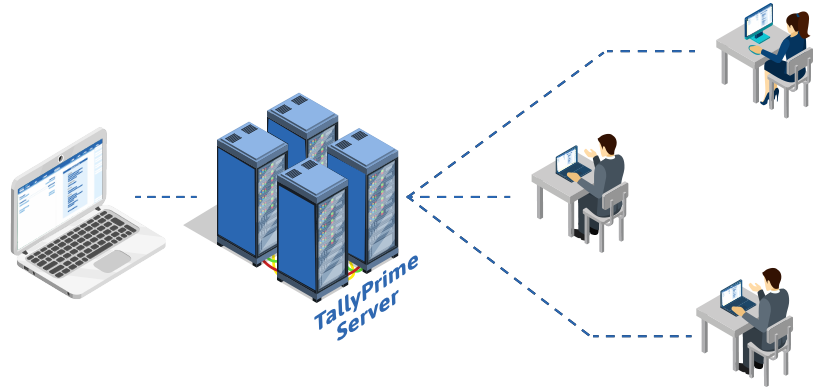Binarysoft is Authorised Tally Sales & Implementation Partner in India
+91 742 877 9101 or E-mail: tally@binarysoft.com 10:00 am – 6: 00 pm , Mon-Fri
Binarysoft is Authorised Tally Sales & Implementation Partner in India
+91 742 877 9101 or E-mail: tally@binarysoft.com 10:00 am – 6: 00 pm , Mon-Fri
By Binarysoft Editorial Team | 13-05-2025 10:48:51

The Micro, Small, and Medium Enterprises (MSME) industry stands as the growth engine of the Indian economy, contributing significantly to the nation’s GDP, exports, and employment. Currently the sector accounts for 30% of the country’s GD... Read More
By Binarysoft Editorial Team | 23-03-2024 23:36:45

The Micro, Small, and Medium Enterprises (MSME) industry stands as the growth engine of the Indian economy, contributing significantly to the nation’s GDP, exports, and employment. Currently the sector accounts for 30% of the country’s GD... Read More
By Binarysoft Editorial Team | 13-05-2025 10:49:02

The Micro, Small, and Medium Enterprises (MSME) industry stands as the growth engine of the Indian economy, contributing significantly to the nation’s GDP, exports, and employment. Currently the sector accounts for 30% of the country’s GD... Read More
By Binarysoft Editorial Team | 07-03-2025 14:55:47

The Micro, Small, and Medium Enterprises (MSME) industry stands as the growth engine of the Indian economy, contributing significantly to the nation’s GDP, exports, and employment. Currently the sector accounts for 30% of the country’s GD... Read More
By Binarysoft Editorial Team | 23-03-2024 23:38:42

The Micro, Small, and Medium Enterprises (MSME) industry stands as the growth engine of the Indian economy, contributing significantly to the nation’s GDP, exports, and employment. Currently the sector accounts for 30% of the country’s GD... Read More
By Binarysoft Editorial Team | 23-03-2024 23:38:16

The Micro, Small, and Medium Enterprises (MSME) industry stands as the growth engine of the Indian economy, contributing significantly to the nation’s GDP, exports, and employment. Currently the sector accounts for 30% of the country’s GD... Read More
By Binarysoft Editorial Team | 23-03-2024 18:13:53

The Micro, Small, and Medium Enterprises (MSME) industry stands as the growth engine of the Indian economy, contributing significantly to the nation’s GDP, exports, and employment. Currently the sector accounts for 30% of the country’s GD... Read More
By Binarysoft Editorial Team | 27-03-2024 07:47:19

To ensure timely payments to the Micro, Small and Medium Enterprises (MSME) sector, a new regulation will be implemented from April 1. This regulation requires companies to settle their dues with MSMEs within 45 days. Non-compliance will lead to a ta... Read More
By Binarysoft Editorial Team | 12-04-2024 06:48:54

The Income Tax department has made it easier for taxpayers to file their taxes for the financial year 2023-24 (FY24) by rolling out online forms ITR-1, ITR-2, and ITR-4, on its website.... Read More
By Binarysoft Editorial Team | 12-04-2024 06:55:03

The Income Tax department has released an interim action plan for the fiscal year 2024-25, which will focus on areas such as identifying cases of TDS short-payment, expediting appeals processing, and others.... Read More
By Binarysoft Editorial Team | 30-04-2024 13:59:29

Payroll Accounting in Tally Prime || Salary Entry in Tally Prime... Read More
By Binarysoft Editorial Team | 14-08-2024 16:53:11

Both companies and auditors have a significant responsibility to adhere to the MCA's notification regarding the audit trail. Non-compliance can lead to substantial financial penalties and personal liabilities, with severe cases potentially leadin... Read More
By Binarysoft Editorial Team | 28-10-2024 04:33:18

Tally is compatible exclusively with Windows OS for installation. However, it can be accessed via cloud platforms on any operating system, like Mac, using a browser such as Google Chrome.... Read More
By Binarysoft Editorial Team | 28-10-2024 10:31:35

For Tally users considering a renewal, Binarysoft Technologies offers a notable 10% discount on two-year renewals for Tally software subscriptions. This option is particularly beneficial for users seeking continuous access to Tally’s ... Read More
By Binarysoft Editorial Team | 28-10-2024 05:00:34

For Tally users considering a renewal, Binarysoft Technologies offers a notable 10% discount on two-year renewals for Tally software subscriptions. This option is particularly beneficial for users seeking continuous access to Tally’s ... Read More
By Binarysoft Editorial Team | 10-01-2025 13:08:13

Tally Prime Server elevates your business with its advanced data server capabilities, available with the Gold license.... Read More
Applicable for CAs / Firms Using GOLD (Multi User ) Only
Renew your license now and upgrade from Tally ERP 9 to Tally Prime for Free!₹ 6750 + 18% GST (₹ 1215)
Applicable for CAs / Firms Using GOLD (Multi User ) Only
Renew your license now and upgrade from Tally ERP 9 to Tally Prime for Free!
₹ 12150
+ 18% GST (₹ 2187)

Unlimited Multi-User Edition For Multiple PCs on LAN Environment
Renew your license now and upgrade from Tally ERP 9 to Tally Prime for Free!₹ 13500 + 18% GST (₹ 2430)
Unlimited Multi-User Edition For Multiple PCs on LAN Environment
Renew your license now and upgrade from Tally ERP 9 to Tally Prime for Free!
₹ 24300
+ 18% GST (₹ 4374)

Single User Edition For Standalone PCs ( Not applicable for Rental License )
Renew your license now and upgrade from Tally ERP 9 to Tally Prime for Free!₹ 4500 + 18% GST (₹ 810)
Single User Edition For Standalone PCs ( Not applicable for Rental License )
Renew your license now and upgrade from Tally ERP 9 to Tally Prime for Free!
₹ 8100
+ 18% GST (₹ 1458)

Tally On Cloud ( Per User Annual)
Now access Tally Prime anytime from anywhere – Just Deploy your Tally License and Tally Data on our Cloud Solution.₹ 7000 + 18% GST (₹ 1260)
Unlimited Multi-User Edition
For EMI options, please Call: +91 742 877 9101 or E-mail: tally@binarysoft.com (10:00 am – 6: 00 pm , Mon-Fri)₹ 67500 + 18% GST (₹ 12150)
Unlimited Multi-User Edition For Multiple PCs on LAN Environment
Renew your license now and upgrade from Tally ERP 9 to Tally Prime for Free!₹ 45000 + 18% GST (₹ 8100)
Single User Edition For Standalone PCs
For EMI options, please Call: +91 742 877 9101 or E-mail: tally@binarysoft.com (10:00 am – 6: 00 pm , Mon-Fri)₹ 22500 + 18% GST (₹ 4050)
(Per User/One Year)
TallyPrime latest release pre-installed₹ 7200 + 18% GST (₹ 1296)
(Two Users/One Year)
TallyPrime latest release pre-installed₹ 14400 + 18% GST (₹ 2592)
(Four Users/One Year)
TallyPrime latest release pre-installed₹ 21600 + 18% GST (₹ 3888)
(Eight Users/One Year )
TallyPrime latest release pre-installed₹ 43200 + 18% GST (₹ 7776)
(Twelve Users/One Year)
TallyPrime latest release pre-installed₹ 64800 + 18% GST (₹ 11664)
(Sixteen Users/One Year)
TallyPrime latest release pre-installed₹ 86400 + 18% GST (₹ 15552)